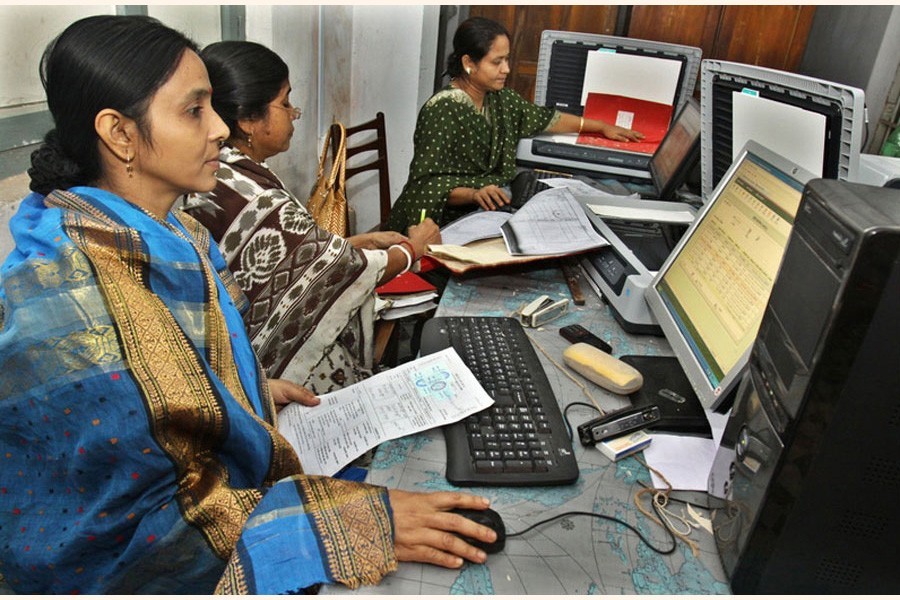There are few terms in the lexicons of the major languages used in the modern times that do not have several synonyms for discrimination against women. It's because since time immemorial, women have been subject to several forms of exploitation. It has been practised so frequently and institutionally, that the anti-women attitude became the part of life in many countries boasting their women's liberation. The truth tells a different story. When by the mid-20th century, the European countries in general granted their women the right to vote, several others continued to dither. These countries have, however, allowed their womenfolk to vote not long ago; quite later than many least developed countries.
To take an incisive look at the different phases of discrimination targeting women, one comes across several categories and levels. Those have been almost entrenched in human societies. Many of them 'respecting' the self-dignity of the weaker sex take pride in the absence of gender discrimination at their social and community lives. But ironically, as the divisiveness remains entrenched in some males, they take apparently innocuous categories. Those are veiled and misguiding. The coinages include the terms like 'misogyny', ` physical limitations', 'inability to think deeply', 'indecision', 'lack of leadership' etc. People keen to show their male dominance must have seen how many of the above female flaws have long been disproved by social activists. The shortcomings are sheer myths. When it comes to the poorer countries, including Bangladesh, the women have seen a remarkable rise in their social status lately. But it's also true except in the segment of the now-defunct curtailment of the voting power, most of the Western women have been enjoying all social privileges for almost a century. They do not want to remain a social drag by following in the males' footstep.
In the 21st century the case of Bangladesh is different from that of the stereotyped one in the past. From economic activities, entrepreneurship in particular, educational achievements, political assertiveness in local government bodies in villages to sport, medical profession etc, they continue to leave their mark. Though humble when compared to their counterparts in the developed world, these are no mean achievements. The greatest of the problems facing the country's women are the male beliefs or inhibitions about their capabilities. It's nothing but the spectre of the realities which prevailed in the developed countries till the early 20th century. In the medieval Europe and other continents, innocent but a little weird women would be burnt alive after they were accused of being involved in witchcraft. Fortunately, the Bangladesh women remained free of these cruelties. But women are still punished for many minor offences. In fact, it was the dawning of the realisation among the males that the persecution of rural women by meting out to them humiliating punishments at 'arbitrations' will only lead to widespread detachment of young women and teenagers from the social mainstreams. These poor women and girls marked with the virtual 'scarlet letter' veritably will open the floodgate of dissensions and the withdrawal syndromes in the country, observe the activists dealing with women.
Thanks to the timely intervention of a few woman Upazila Nirbahi Officers (UNOs), a lot of child marriages could be stopped. Although the local women activists and spirited NGO youths, with the help of vulnerable victims, haven't yet been able to fully uproot the social blight, the movement has evidently created a stir in the country's villages. The women have finally realised that they aren't alone in their helplessness or left in the lurch. They have sympathisers and indefatigable activists whom they can turn to in times of urgency.
In the last decade, the scourge of child marriages, or the forced ones, has witnessed an impressive cut. It could be possible thanks to the phenomenal increase in the number of female students' admission to primary, junior and secondary high schools. What prompted this trend to get off the ground in sending girls in higher numbers to school was the privilege of tuition-free education. In course of time, the stimulus like the distribution of textbooks had added to the force of the women being educated. Although the urban adolescent girls are comparatively better off, they, too, have their own problems and disadvantages. Passing the school final exams and entering the college phase with ease, they aren't completely free of the typical urban ordeals. Those begin with the common social ills which plague the vast rural swathes. The urban teenage girls and the young women, blissfully, are tolerably free of poverty and the social decrees leading to their rural counterparts' early marriage. They are relatively solvent in terms of their parents' ability to bear their added educational expenses.
Except the poverty-stricken girls from the lower-middle classes, the urban SSC and HSC-level affluent ones can smoothly reach the university admission stage. Those who cannot make it to the public universities go for the private and government colleges. It's only the highly fortunate girls from the solvent families who can enrol in the private universities. Despite all these advantages prevalent in the cities and bigger towns, the urban girls and young women cannot claim themselves to be free of the many ordeals facing the rural young girls. The most atrocious of them is sexual harassment which haunts their lives as long as they move around the cities. In a fast developing country like Bangladesh, these behavioural evils are unacceptable. When the country's women are showing their heard-earned flashes of genius in areas ranging from entrepreneurship, academic arena, socio-economic sectors, sport and adventure, the largely invisible thorns shouldn't be allowed to dishearten them. To speak forthrightly, Bangladesh has yet to fully correct its gender position which is biased, socially, against women.
shihabskr@ymail.com


